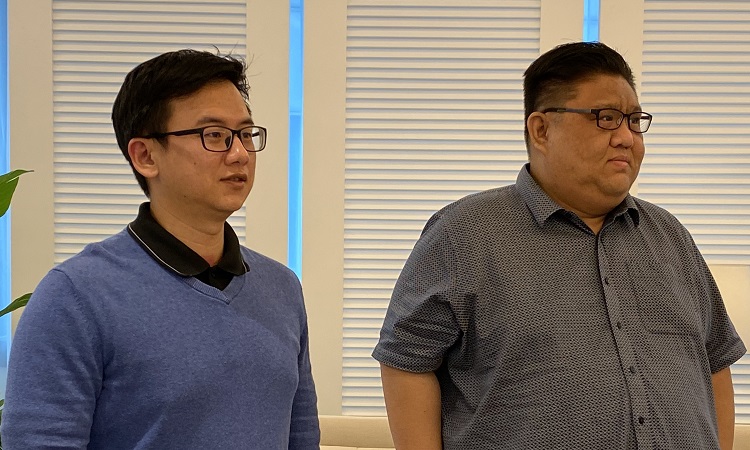Digital News Asia (DNA) recently featured the Skymind founders in its 2020/2021 issue of Digerati50. Credit goes to DNA for this exclusive report below.
“Wewant Malaysia to innovate,” says Shawn Tan, “(and) not to just buy software”.
This is the sort of lament that is often heard. But when it comes from the cofounder and CEO of Skymind, a company that is putting up an US$800 million fund to boost AI ecosystems around the world, you might want to listen to what else the Perlis-born Malaysian has to say.
Or at least look at what he is doing. Shawn (right in pic), along with fellow Skymind cofounder and COO Dr Goh Shu Wei, is hard at work to build a Malaysian AI talent pool to feed the industry’s ravenous appetite for AI engineers.
They want 300 engineers by the end of 2020 just to handle the work they have in hand in Malaysia. They would like a thousand. Even that is pittance. A Chinese tech giant told Shawn flat out, “we will take everyone you can train”.
Credibility comes from the fact that Skymind sees more than 350 of the Fortune 500 using its AI technology.
Its revenue for 2019 hovered around half a billion US dollars, claims Shawn, with over 90% coming from China. This has enabled them to put up US$300 million into their AI ecosystem fund.
“We can fund the full US$800 million ourselves but there is interest from some parties, including the Middle East,” says Shawn.
We’re talking serious money here. Not bad for a duo whose story, however, begins in the 1980’s in Malaysia’s least likely state to produce a leading AI company – Perlis.
“We were classmates since primary school,” says Shawn.
They momentarily parted to go to university where Shawn dropped out four months into his law course in the UK.
“Too young at the time,” he shrugs.
Meanwhile, Goh ended up in the US, going all the way to get his PhD in civil engineering.
As one of the few students who could speak both Mandarin and English, Goh found himself tutoring students from China. One of them ended up at the Chinese Ministry of Transport’s R&D centre.
In 2013 he reached out to Goh, remembering that Goh had created an additive that would make it easier to build roads.
The collaboration resulted in an additive that is used in building roads all over China today. Shawn proudly highlights that 90% of the roads built in Beijing today have Goh’s additive in them.
As the global commercial arm for the product, the duo did relatively well.
But Goh wasn’t content with having produced his additive. He started using AI to determine the maintenance schedule for roads which was still a manual time-intensive exercise.
It was a revelation. They had their first taste of the power of AI.
Then, in 2014, another piece of the puzzle fell into place. Goh was contacted by Adam Gibson, who was at the same university.
Three years prior, Adam had co-authored an AI programming library called deeplearning4j (DL4J) with Skymind as the commercial entity to support his open source library.
Wanting to tap the Chinese market, they launched Skymind Hong Kong in 2015.
Commercial opportunities were tough to come by in those early days of AI but they made steady progress on the back of their DL4J.
“Not many companies are able to build an AI infrastructure,” says Goh.
Thanks to that, today in the world of AI, “we are everywhere,” he says.
Skymind is also helping develop standards, such as China’s AI industrial standard with the Chinese Academy of Sciences, and an AI ecosystem in Southeast Asia with Huawei.
Back to their plans for making Malaysia a centre for AI, they have already invested over RM200 million into purchasing a building in Penang that will serve as an AI training institute.
They are already offering a 12-day course in AI with the promise to hire those who pass for RM 4,000 a month.
Ultimately, the two cofounders are optimistic that Malaysia has the foundation to produce AI engineers with Goh pointing out that many CTOs in the Silicon Valley are Malaysians.
“We just need to upskill them,” says Goh. “It’s a waste if Malaysia doesn’t get on the AI wave.”

